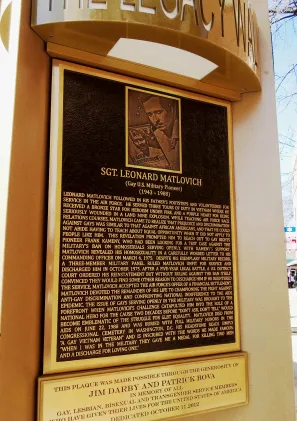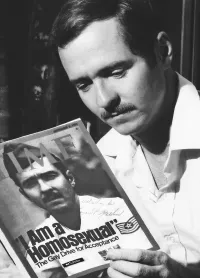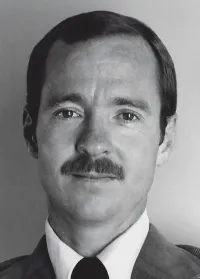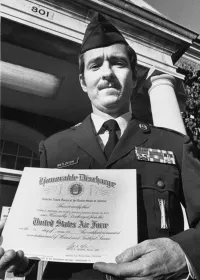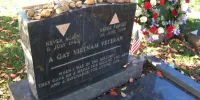Plaque Sponsor
James Darby and Patrick Bova in memory of all gay, lesbian, bisexual and transgender service members who have given their lives for the United States of AmericaBiography
1943 - 1988
"And I want you to look at the flag, our rainbow flag, and I want you to look at it with pride in your heart, because we too have a dream. And what is our dream? Ours is more than an American dream. It's a universal dream ... And our mission is to reach out and teach people to love, and not to hate. And you know the reality of the situation is that before we as an individual meet, the only thing we have in common is our sexuality. And in the AIDS crisis – and I have AIDS – and in the AIDS crisis, if there is any one word that describes our community's reaction to AIDS, that word is love, love, love."
- Leonard Matlovich in his last public speech
Leonard Matlovich followed in his father's footsteps and volunteered for service in the Air Force. He served three tours of duty in Vietnam where he received a Bronze Star for heroism under fire, and a Purple Heart for being seriously wounded in a land mine explosion. While teaching Air Force race relations courses, Matlovich came to realize that prejudice and discrimination against gays was similar to that against African-Americans, and that he could not abide having to teach about equal opportunity when it did not apply to people like him. This revelation prompted him to reach out to gay rights pioneer Frank Kameny, who had been looking for a test case against the military’s ban on homosexuals serving openly. With Kameny’s support, Matlovich revealed his homosexuality in a carefully worded letter to his commanding officer on March 6, 1975. Despite his exemplary military record, a three-member military panel ruled Matlovich unfit for service, and discharged him in October 1975. After a five-year legal battle, a U.S. District Court ordered his reinstatement but without ruling against the ban itself. Convinced they would find some other reason to discharge him if he reentered the service, Matlovich accepted the Air Force’s offer of a financial settlement. Matlovich devoted the remainder of his life to championing the fight against anti-gay discrimination and confronting national indifference to the AIDS epidemic. The issue of gays serving openly in the military was brought to the forefront when Matlovich's challenge catapulted him into the role of a national hero for the cause two decades before “Don’t Ask, Don’t Tell” would become emblematic of the struggle for GLBT equality. Matlovich died from AIDS on June 22, 1988 and was buried with full military honors in the Congressional Cemetery in Washington, D.C. His headstone reads simply "A Gay Vietnam Veteran" and is inscribed with the words he made famous: "When I was in the military they gave me a medal for killing two men and a discharge for loving one.”
1943 - 1988
"And I want you to look at the flag, our rainbow flag, and I want you to look at it with pride in your heart, because we too have a dream. And what is our dream? Ours is more than an American dream. It's a universal dream ... And our mission is to reach out and teach people to love, and not to hate. And you know the reality of the situation is that before we as an individual meet, the only thing we have in common is our sexuality. And in the AIDS crisis – and I have AIDS – and in the AIDS crisis, if there is any one word that describes our community's reaction to AIDS, that word is love, love, love."
- Leonard Matlovich in his last public speech
Leonard Matlovich followed in his father's footsteps and volunteered for service in the Air Force. He served three tours of duty in Vietnam where he received a Bronze Star for heroism under fire, and a Purple Heart for being seriously wounded in a land mine explosion. While teaching Air Force race relations courses, Matlovich came to realize that prejudice and discrimination against gays was similar to that against African-Americans, and that he could not abide having to teach about equal opportunity when it did not apply to people like him. This revelation prompted him to reach out to gay rights pioneer Frank Kameny, who had been looking for a test case against the military’s ban on homosexuals serving openly. With Kameny’s support, Matlovich revealed his homosexuality in a carefully worded letter to his commanding officer on March 6, 1975. Despite his exemplary military record, a three-member military panel ruled Matlovich unfit for service, and discharged him in October 1975. After a five-year legal battle, a U.S. District Court ordered his reinstatement but without ruling against the ban itself. Convinced they would find some other reason to discharge him if he reentered the service, Matlovich accepted the Air Force’s offer of a financial settlement. Matlovich devoted the remainder of his life to championing the fight against anti-gay discrimination and confronting national indifference to the AIDS epidemic. The issue of gays serving openly in the military was brought to the forefront when Matlovich's challenge catapulted him into the role of a national hero for the cause two decades before “Don’t Ask, Don’t Tell” would become emblematic of the struggle for GLBT equality. Matlovich died from AIDS on June 22, 1988 and was buried with full military honors in the Congressional Cemetery in Washington, D.C. His headstone reads simply "A Gay Vietnam Veteran" and is inscribed with the words he made famous: "When I was in the military they gave me a medal for killing two men and a discharge for loving one.”
Lesson Plan
Please login or register for an account to view this lesson plan.
Demography
Demography
Gender Male
Sexual Orientation Gay
Gender Identity Cisgender
Ethnicity Caucasian/White
Nations Affiliated United States
Era/Epoch AIDS Era (1980-present) Information Age (1970-present) Post-Stonewall Era (1974-1980) Vietnam War (1955-1975)
Field(s) of Contribution
Advocacy & Activism
Civics, Government, Politics, & Law
Education
Military
Social Justice
Social Sciences
US History
Commemorations & Honors
Papers and Memorabilia Housed at San Francisco GLBT Historical Society
Bronze Star Medal for Vietnam War Bravery
Purple Heart for Vietnam War Injuries
Air Force Commendation Medal
Time Magazine Cover (1975)
Congressional Cemetery Burial (1988)
Plaque Installed Near Matlovich's Apartment on 18th and Castro Streets in San Francisco (2008)
National LGBTQ Wall of Honor at the Stonewall National Monument Inductee (2019)
San Francisco Rainbow Honor Walk Honoree (2019)
Demography
Gender Male
Sexual Orientation Gay
Gender Identity Cisgender
Ethnicity Caucasian/White
Nations Affiliated United States
Era/Epoch AIDS Era (1980-present) Information Age (1970-present) Post-Stonewall Era (1974-1980) Vietnam War (1955-1975)
Field(s) of Contribution
Advocacy & Activism
Civics, Government, Politics, & Law
Education
Military
Social Justice
Social Sciences
US History
Commemorations & Honors
Papers and Memorabilia Housed at San Francisco GLBT Historical Society
Bronze Star Medal for Vietnam War Bravery
Purple Heart for Vietnam War Injuries
Air Force Commendation Medal
Time Magazine Cover (1975)
Congressional Cemetery Burial (1988)
Plaque Installed Near Matlovich's Apartment on 18th and Castro Streets in San Francisco (2008)
National LGBTQ Wall of Honor at the Stonewall National Monument Inductee (2019)
San Francisco Rainbow Honor Walk Honoree (2019)
Resources
Resources
Duberman, Martin. "Sex and the Military: The Matlovich Case (1976)." Left Outside: The Politics of Exclusion / Essays / 1964-1999. New York: Basic Books, 1999.
Hippler, Mike. Matlovich: The Good Soldier. Boston: Alyson, 1989.
Humphrey, Mary Ann. My Country, My Right to Serve : Experiences of Gay Men and Women in the Military, World War II to the Present. New York: Harper Collins, 1990.
Matlovich, Leonard. "Gays on the March." Time (September 8, 1975): 32-43.
Shilts, Randy. Conduct Unbecoming: Gays and Lesbians in the U.S. Military. New York: St. Martin's Press, 1993.
http://articles.latimes.com/1988-06-24/news/mn-5916_1_leonard-matlovich
http://www.nytimes.com/1988/06/24/us/gay-airman-who-fought-ouster-dies-from-aids.html
http://time.com/4019076/40-years-leonard-matlovich/
http://www.bbc.com/news/magazine-21896925
http://www.leonardmatlovich.com/
Resources
Duberman, Martin. "Sex and the Military: The Matlovich Case (1976)." Left Outside: The Politics of Exclusion / Essays / 1964-1999. New York: Basic Books, 1999.
Hippler, Mike. Matlovich: The Good Soldier. Boston: Alyson, 1989.
Humphrey, Mary Ann. My Country, My Right to Serve : Experiences of Gay Men and Women in the Military, World War II to the Present. New York: Harper Collins, 1990.
Matlovich, Leonard. "Gays on the March." Time (September 8, 1975): 32-43.
Shilts, Randy. Conduct Unbecoming: Gays and Lesbians in the U.S. Military. New York: St. Martin's Press, 1993.
http://articles.latimes.com/1988-06-24/news/mn-5916_1_leonard-matlovich
http://www.nytimes.com/1988/06/24/us/gay-airman-who-fought-ouster-dies-from-aids.html
http://time.com/4019076/40-years-leonard-matlovich/
http://www.bbc.com/news/magazine-21896925
http://www.leonardmatlovich.com/
